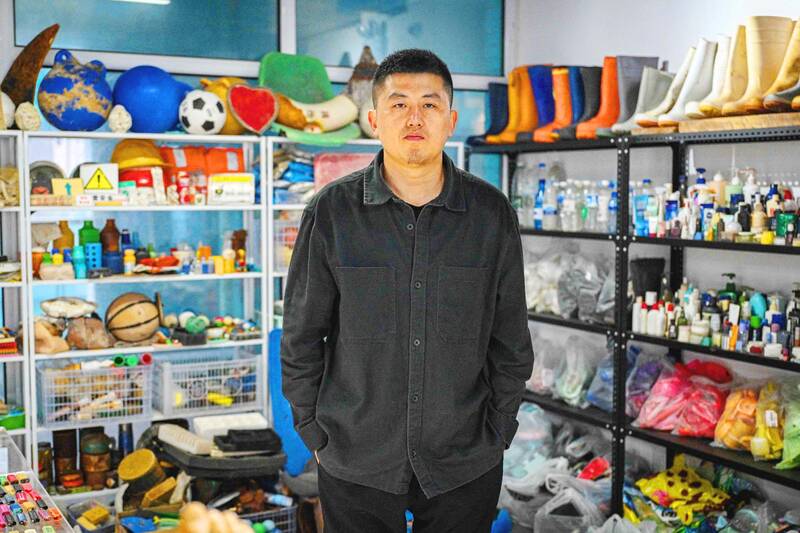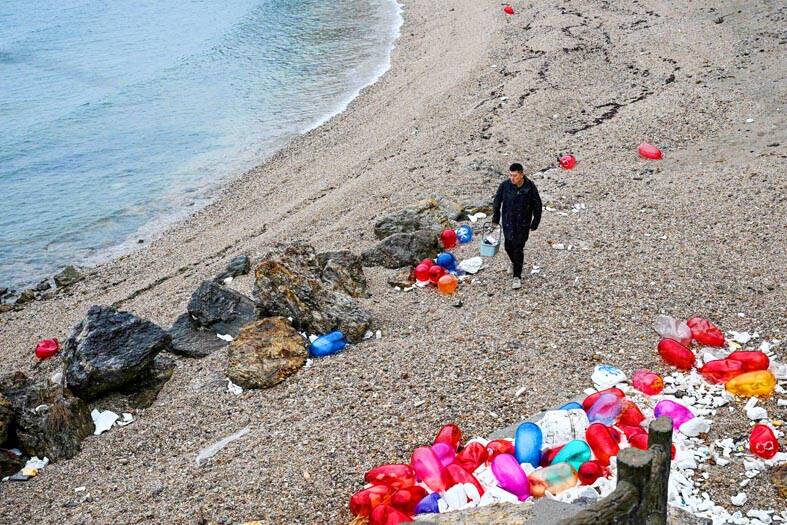As storm clouds gathered on a forgotten beach in China’s Miaodao islands, artist Fu Junsheng picked his way through piles of plastic waste washed up along the shoreline, looking for inspiration.
China is the world’s largest plastic producer, and the islands — a niche tourist destination — sit in the cross-stream of several highly developed eastern peninsulas. Every squall brings fresh waves of floating debris onto the archipelago’s white sand beaches. Eight years ago Fu decided to make that waste his artistic message and medium.
“Our generation has witnessed rapid societal development. In the process, we’ve sometimes neglected nature, and at times, even ignored it altogether,” the 36-year-old said as he showed reporters around his studio, full of pieces created from plastic washed ashore.

Photo: AFP
One of the most striking installations features nearly 900 flip-flops displayed in front of his seascape oil paintings.
Marine debris “carries our daily life, the life of each of us,” he said.
The oldest item Fu has collected is an instant noodle packet from 1993. Despite more than 30 years of exposure to the elements, it remains intact, showing hardly any signs of decomposition.

Photo: AFP
Objects like this “don’t disappear, but instead break down into tiny particles, which can end up being ingested by marine life and, eventually, by us,” Fu said. “This process is invisible to the naked eye.”
The Miaodao islands sit opposite the Korean Peninsula, where this week negotiators from around the world are attempting to hammer out an international treaty to curb plastic pollution.
Fu has found lighters and coffee bottles from South Korea on his beachcombing trips.
“Marine ecological protection requires people from different countries and regions to work together,” he said. “It’s not a localized issue — it’s a broader, global problem.”
At university in nearby Qingdao, Fu became interested in the environmental consequences of China’s rapid urbanization from the late 1980s onward. These days China’s factories make the most plastic worldwide — 75 million tonnes in last year, according to official statistics.
While it is not considered the world’s largest plastic polluter, its 1.4 billion citizens still created 63 million tonnes of waste plastic in 2022, state media reported, citing a national body.
Most of that was recycled, put into landfills or incinerated — about 30 percent each — while 7 percent was directly abandoned.
Fu said that while completely eliminating plastic use is unrealistic, it is essential to use it in a “more controllable and precise way.”
More than 90 percent of plastic worldwide is not recycled, with more than 20 million tonnes leaking into the environment, often after just a few minutes of use.
“People often approach these problems from an individual perspective, but environmental issues are collective challenges for humanity,” Fu said.
Fu has collected countless objects — mostly everyday household items such as children’s toys, balloons, toothbrushes and bottles.
He said his aim is to make the public recognize how intimately marine pollution is tied to their daily lives.
In one piece posted online, he constructed a rainbow from colored plastic bits; in another, a deflated sex doll is surrounded by tens of multicolored rubber gloves. One display includes a shelf of worn cosmetics and toiletries containers.
“These products are meant to make us feel cleaner and more beautiful, but they often end up in the ocean, polluting the water, damaging marine ecosystems and ultimately making our world less beautiful,” Fu said.

MONEY GRAB: People were rushing to collect bills scattered on the ground after the plane transporting money crashed, which an official said hindered rescue efforts A cargo plane carrying money on Friday crashed near Bolivia’s capital, damaging about a dozen vehicles on highway, scattering bills on the ground and leaving at least 15 people dead and others injured, an official said. Bolivian Minister of Defense Marcelo Salinas said the Hercules C-130 plane was transporting newly printed Bolivian currency when it “landed and veered off the runway” at an airport in El Alto, a city adjacent to La Paz, before ending up in a nearby field. Firefighters managed to put out the flames that engulfed the aircraft. Fire chief Pavel Tovar said at least 15 people died, but

LIKE FATHER, LIKE DAUGHTER: By showing Ju-ae’s ability to handle a weapon, the photos ‘suggest she is indeed receiving training as a successor,’ an academic said North Korea on Saturday released a rare image of leader Kim Jong-un’s teenage daughter firing a rifle at a shooting range, adding to speculation that she is being groomed as his successor. Kim’s daughter, Ju-ae, has long been seen as the next in line to rule the secretive, nuclear-armed state, and took part in a string of recent high-profile outings, including last week’s military parade marking the closing stages of North Korea’s key party congress. Pyongyang’s official Korean Central News Agency (KCNA) released a photo of Ju-ae shooting a rifle at an outdoor shooting range, peering through a rifle scope

South Korea would soon no longer be one of the few countries where Google Maps does not work properly, after its security-conscious government reversed a two-decade stance to approve the export of high-precision map data to overseas servers. The approval was made “on the condition that strict security requirements are met,” the South Korean Ministry of Land, Infrastructure and Transport said. Those conditions include blurring military and other sensitive security-related facilities, as well as restricting longitude and latitude coordinates for South Korean territory on products such as Google Maps and Google Earth, it said. The decision is expected to hurt Naver and Kakao

Australian Prime Minister Anthony Albanese yesterday said he did not take his security for granted, after he was evacuated from his residence for several hours following a bomb threat sent to a Chinese dance group. Albanese was evacuated from his Canberra residence late on Tuesday following the threat, and returned a few hours later after nothing suspicious was found. The bomb scare was among several e-mails threatening Albanese sent to a representative of Shen Yun, a classical Chinese dance troupe banned in China that is due to perform in Australia this month, a spokesperson for the group said in a statement. The e-mail